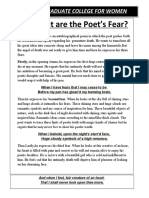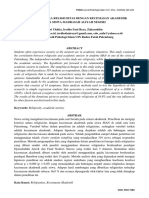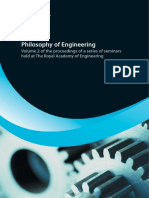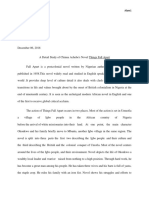Kubla Khan As An Opium Dream 1
Kubla Khan As An Opium Dream 1
Uploaded by
Manish Kumar DubeyCopyright:
Available Formats
Kubla Khan As An Opium Dream 1
Kubla Khan As An Opium Dream 1
Uploaded by
Manish Kumar DubeyOriginal Title
Copyright
Available Formats
Share this document
Did you find this document useful?
Is this content inappropriate?
Copyright:
Available Formats
Kubla Khan As An Opium Dream 1
Kubla Khan As An Opium Dream 1
Uploaded by
Manish Kumar DubeyCopyright:
Available Formats
The romantic psychology of poetic invention is what we may call imagination.
In Biographia Literaria, Coleridge distinguishes between fancy and imagination, the latter being a superior faculty which dissolves, dissipates, diffuses in order to recreate. The greatest poetry reconciles the opposites of nature and art. Kubla Khan is hence more than just an opium dream, for it is the celebration of imagination. Kubla Khan represents poets of all ages, and the absoluteness conveyed by his name fails to be transferred to his creation-between the person and the performance falls the shadow. The poem begins in Xanadu, a place in the east, evoking the spirit of birth and creation. The river Alph, flowing through caverns measureless to man, suggests realism which is vouchsafed only to a poet. The Romantics preoccupation with the myths and the mystic is echoed in the very choice of these imageries. Kublas dome is a story of romanticism, accommodating twice five miles of fertile ground/With walls and towers were girdled round: The dome needs to be protected, and therefore is a fall of the poetry. Kublas dome claims to capture both the garden of innocence and the forest of experience and thus is Coleridges assertion that the earthly paradise the Poet creates is superior to the paradise man has lost. The word fertile prompts a psycho-sexual experience- the entire first part correspond to an act of sexual union as the poet seeks to be impregnated with the spirit which would cause the womb of the dome. The images of fertile, caverns, fast thick pants, a mighty fountain momently was forced represents the birth of poetry. The savage place is the site where the poet dissolves, diffuses, dissipates in order to recreate and is therefore holy. The demon lover is the supernatural solicitation of poetry through imagination, the woman is as if the poet himself, revelling in the glory of being able to procreate perfect poetry. Nature seems to be an objective correlative for the eruption that is occurring within the poets mindAnd from this chasm, with ceaseless turmoil seething As if this Earth in fast thick pants were breathing A mighty fountain momently was forced:. The mighty fountain is the fountain of poetry occurring in swift half-intermitted bursts. But every moment happening is every moment lost and even the sacred river, the poets imagination, after five miles of mazy motion must sink to a lifeless ocean- the feel of poetry is for a moment as the experience of Elfin Grot is but transitory. It is the knowledge of this that the ancestral voices seem to be prophesying- since the dawn of perception, no poem could capture the poetry that is in the Poets imagination. The dome incorporates the mingled measure, the marriage of fundamental opposites- life and death, creation and destruction and so on. The image of shadow suggests instability-between the desire and the spasm fall the shadow. In the last part Coleridge reaches out to the readers directly. Music is a common theme is the romantics, and the eternal music of the Abyssinian maid singing at Mt. Abora as if becomes the spirit of the song- the song resonates in the entire imaginative canvas of the poet and he says that Could I revive within me/her symphony and song, he would produce the dome in air. If the poet could act out his vision he would appear as Apollo with flashing eyes and floating air, or the rising Orc, the fiery don of the new Beulah, or Nataraj, who had drunk the milk of paradise. The poet in his emotional frenzy would then frighten everybody with his unfamiliar form. The poem is a manifestation of the failure to achieve a synthesis between the Dionysian and the Apollonian.
The romantic psychology of poetic invention is what we may call imagination. In Biographia Literaria, Coleridge distinguishes between fancy and imagination, the latter being a superior faculty which dissolves, dissipates, diffuses in order to recreate. The greatest poetry reconciles the opposites of nature and art. Kubla Khan is hence more than just an opium dream, for it is the celebration of imagination. Kubla Khan represents poets of all ages, and the absoluteness conveyed by his name fails to be transferred to his creation-between the person and the performance falls the shadow. The poem begins in Xanadu, a place in the east, evoking the spirit of birth and creation. The river Alph, flowing through caverns measureless to man, suggests realism which is vouchsafed only to a poet. The Romantics preoccupation with the myths and the mystic is echoed in the very choice of these imageries. Kublas dome is a story of romanticism, accommodating twice five miles of fertile ground/With walls and towers were girdled round: The dome needs to be protected, and therefore is a fall of the poetry. Kublas dome claims to capture both the garden of innocence and the forest of experience and thus is Coleridges assertion that the earthly paradise the Poet creates is superior to the paradise man has lost.
You might also like
- 1959 Jehovah's Witnesses in The Divine Purpose PDFDocument321 pages1959 Jehovah's Witnesses in The Divine Purpose PDFjanineNo ratings yet
- Q1Document32 pagesQ1Jamshaid KhanNo ratings yet
- Duchess of Malfi - Moral VisionDocument14 pagesDuchess of Malfi - Moral VisionArghya Chakraborty100% (1)
- Frost - "Home Burial"Document5 pagesFrost - "Home Burial"Alicia Y. Wei100% (2)
- Supernaturalism in Kubla Khan 1Document1 pageSupernaturalism in Kubla Khan 1Manish Kumar Dubey100% (3)
- Characteristics of The Age of PopeDocument19 pagesCharacteristics of The Age of PopeSana NoorNo ratings yet
- M. A. YadavDocument20 pagesM. A. YadavAnonymous wcKV14BgRNo ratings yet
- The Love Song of J Alfred Prufrock by TDocument2 pagesThe Love Song of J Alfred Prufrock by Tنغم رعد داخل A صباحيNo ratings yet
- Savitri Book 1 Canto 1 Post 5Document3 pagesSavitri Book 1 Canto 1 Post 5api-3740764No ratings yet
- Coleridge Biographia Literaria: 3.0 ObjectivesDocument5 pagesColeridge Biographia Literaria: 3.0 ObjectivesSTANLEY RAYENNo ratings yet
- John Keats EndymionDocument16 pagesJohn Keats EndymionGabriela BarnaNo ratings yet
- Dissociation of SensibilityDocument7 pagesDissociation of SensibilityotherthannomadologyNo ratings yet
- William Wordsworth - Preface To Lyrical BalladsDocument2 pagesWilliam Wordsworth - Preface To Lyrical Balladstyler durdenNo ratings yet
- Infant Joy Infant SorrowDocument4 pagesInfant Joy Infant SorrowCecilia Garfias100% (1)
- School of Indian Aesthetics) Which Was Later Elaborately: ND NDDocument5 pagesSchool of Indian Aesthetics) Which Was Later Elaborately: ND NDChandan KumarNo ratings yet
- The Whitsun WeddingsDocument2 pagesThe Whitsun WeddingsNilanjana DebNo ratings yet
- The Scholar GypsyDocument11 pagesThe Scholar Gypsysathish100% (1)
- As A RefutationDocument2 pagesAs A RefutationSaleem Raza100% (1)
- Riders To The Sea As A Poetic DramaDocument3 pagesRiders To The Sea As A Poetic DramaAshes Mitra100% (2)
- Study Material 1 PDFDocument13 pagesStudy Material 1 PDFkritanjali konwarNo ratings yet
- Savitri Book 1 Canto 1 Post 4Document3 pagesSavitri Book 1 Canto 1 Post 4api-3740764No ratings yet
- The Pioneer of The Great Victorian RenaissanceDocument5 pagesThe Pioneer of The Great Victorian RenaissanceArpita Dutta100% (2)
- Faerie Queene Blog 28pDocument28 pagesFaerie Queene Blog 28pEbrahim MahomedNo ratings yet
- Sailing To Byzantium by WDocument2 pagesSailing To Byzantium by WTANBIR RAHAMANNo ratings yet
- Ode To Nightingale by KeatsDocument4 pagesOde To Nightingale by Keatsmanazar hussainNo ratings yet
- The Daedelus Myth in A Portrait of The Artist As A Young ManDocument5 pagesThe Daedelus Myth in A Portrait of The Artist As A Young ManHsanul BannaNo ratings yet
- Traditional Symbolism in Kubla KhannDocument5 pagesTraditional Symbolism in Kubla KhannMelanie HadzegaNo ratings yet
- The Canonization by John Donne Essay Example For FreeDocument4 pagesThe Canonization by John Donne Essay Example For Freepriya royNo ratings yet
- Portrait of The Artist As A Young Man-1Document22 pagesPortrait of The Artist As A Young Man-1Christie Pegu100% (1)
- 4 Phases of ShakuntalaDocument2 pages4 Phases of ShakuntalaEduardo CatalanNo ratings yet
- Bird Imagery in Portrait of The Artist As A Young ManDocument2 pagesBird Imagery in Portrait of The Artist As A Young ManProfadeengleza8No ratings yet
- Whitsun Weedings DG PDFDocument4 pagesWhitsun Weedings DG PDFWhite PandaNo ratings yet
- All Poetry - 6th SemDocument17 pagesAll Poetry - 6th SemsahilNo ratings yet
- Assignment 1Document6 pagesAssignment 1Sumaira MalikNo ratings yet
- Wordsworth's Attitude To Nature and Man As Revealed in Tintern AbbeyDocument2 pagesWordsworth's Attitude To Nature and Man As Revealed in Tintern AbbeyAly FahadNo ratings yet
- Examples Figures of Speech and Allusions: THE TIGER by William BlakeDocument4 pagesExamples Figures of Speech and Allusions: THE TIGER by William BlakePatricia BaldonedoNo ratings yet
- John Keats (Questions)Document5 pagesJohn Keats (Questions)PrithvirajThakurNo ratings yet
- SENSUOUS AND SCHOLARLY READING IN KEATS'S ON FIRST LOOKING INTO CHAPMAN'S HOMER' / Thomas DayDocument8 pagesSENSUOUS AND SCHOLARLY READING IN KEATS'S ON FIRST LOOKING INTO CHAPMAN'S HOMER' / Thomas DayraimondisergioNo ratings yet
- Essay Sonnet 65-RevisedDocument6 pagesEssay Sonnet 65-Revisedapi-350031340100% (1)
- English MA Last PDFDocument25 pagesEnglish MA Last PDFkuldeep44No ratings yet
- Horace As A CriticDocument9 pagesHorace As A CriticDoc Gievanni Simpkini100% (1)
- 09 Shelley Defence of PoetryDocument5 pages09 Shelley Defence of PoetrysujayreddNo ratings yet
- When I Have FearsDocument2 pagesWhen I Have Fearsmanazar hussainNo ratings yet
- Abstract On "Dawn at Puri" by Jayanta MahapatraDocument10 pagesAbstract On "Dawn at Puri" by Jayanta MahapatraVada DemidovNo ratings yet
- Hopkins - The WindhoverDocument3 pagesHopkins - The WindhoverCarmen VoicuNo ratings yet
- Tintern Abbey: William Wordsworth - Summary and Critical AnalysisDocument3 pagesTintern Abbey: William Wordsworth - Summary and Critical AnalysisBianca DarieNo ratings yet
- Seamus HeaneyDocument22 pagesSeamus HeaneyMaida Rana0% (1)
- Summary of To AutumnDocument2 pagesSummary of To AutumnSr Chandrodaya JNo ratings yet
- The Scholar-Gipsy: English Literature Semester-IiDocument4 pagesThe Scholar-Gipsy: English Literature Semester-IiubaidNo ratings yet
- Larkin Ambulances1Document4 pagesLarkin Ambulances1Sumaira MalikNo ratings yet
- Jibanananda Das's "Banalata Sen": An Utter MysteryDocument13 pagesJibanananda Das's "Banalata Sen": An Utter MysteryFarhana YeasminNo ratings yet
- Room of One's Own and CustodyDocument10 pagesRoom of One's Own and CustodyDushyant NimavatNo ratings yet
- The Spanish TragedyDocument6 pagesThe Spanish TragedyAris Chakma100% (3)
- Crisis of National Identity in Agha ShahDocument6 pagesCrisis of National Identity in Agha ShahKhalil AbdulhameedNo ratings yet
- Emily DickinsonDocument7 pagesEmily DickinsonLadrer NlNo ratings yet
- Gothic Elements and A Psychological Reading of The Novel "The Strange Case of DR - Jekyll and MR - Hyde"Document12 pagesGothic Elements and A Psychological Reading of The Novel "The Strange Case of DR - Jekyll and MR - Hyde"kiki shadapNo ratings yet
- In Memorium Poems MeaningsDocument11 pagesIn Memorium Poems MeaningsAdam CarnellNo ratings yet
- Auden As A Poet of NatureDocument4 pagesAuden As A Poet of Naturemanazar hussain100% (1)
- Ode To AutumnDocument3 pagesOde To AutumnTANBIR RAHAMANNo ratings yet
- Verfremdungseffekt Can Be Most Accurately Translated As The 'Making Strange Effect', and It SeeksDocument1 pageVerfremdungseffekt Can Be Most Accurately Translated As The 'Making Strange Effect', and It SeeksManish Kumar DubeyNo ratings yet
- Short Note On Samuel RichardsonDocument1 pageShort Note On Samuel RichardsonManish Kumar Dubey0% (1)
- Supernaturalism in Kubla Khan 2Document1 pageSupernaturalism in Kubla Khan 2Manish Kumar DubeyNo ratings yet
- Proviso Scene 1Document1 pageProviso Scene 1Manish Kumar DubeyNo ratings yet
- Comedy of Manners 1Document1 pageComedy of Manners 1Manish Kumar DubeyNo ratings yet
- Proviso Scene 2Document1 pageProviso Scene 2Manish Kumar DubeyNo ratings yet
- Prose Style of LambDocument1 pageProse Style of LambManish Kumar Dubey67% (3)
- Society in The Way of The WorldDocument1 pageSociety in The Way of The WorldManish Kumar DubeyNo ratings yet
- Lamb's Prose StyleDocument2 pagesLamb's Prose StyleManish Kumar Dubey100% (3)
- Autobiographical Elements in LambDocument1 pageAutobiographical Elements in LambManish Kumar DubeyNo ratings yet
- Allusions in Lamb's EssayDocument2 pagesAllusions in Lamb's EssayManish Kumar DubeyNo ratings yet
- Kecemasan Akademik1Document12 pagesKecemasan Akademik1Liza FizlinaNo ratings yet
- The Great Courses Available As at November 2014: Music and ArtDocument2 pagesThe Great Courses Available As at November 2014: Music and ArtMarcos Fontoura de AndradeNo ratings yet
- Handwriting AnalysisDocument17 pagesHandwriting AnalysisJinxedLavender100% (3)
- Sri Rudram6Document5 pagesSri Rudram6vipinsunariaNo ratings yet
- Planning Theory and HistoryDocument10 pagesPlanning Theory and HistoryErnie GultianoNo ratings yet
- Critical ThinkingDocument33 pagesCritical Thinkingtondutosuau0% (1)
- Questionnaire CRMDocument5 pagesQuestionnaire CRMMehakBatla100% (1)
- Philosophy of Engineering-Vol 2 PDFDocument60 pagesPhilosophy of Engineering-Vol 2 PDFDiego Fernandes de OliveiraNo ratings yet
- Pragmatism Concept of TruthDocument16 pagesPragmatism Concept of Truthhobibelajar701No ratings yet
- World Cement ArticleDocument4 pagesWorld Cement ArticlemkpqNo ratings yet
- Arbaz Mehmood PDFDocument17 pagesArbaz Mehmood PDFgohar rehmanNo ratings yet
- Competition and Social Control in Science: An Essay in Theory-ConstructionDocument20 pagesCompetition and Social Control in Science: An Essay in Theory-ConstructionAvik DattaNo ratings yet
- EducationDocument22 pagesEducationSamrat ChowdhuryNo ratings yet
- The 16 Most Important Scales in JazzDocument5 pagesThe 16 Most Important Scales in JazzAsturias Patria Querida100% (1)
- 3 Way ANOVADocument4 pages3 Way ANOVAvinxincNo ratings yet
- Educated Parents Article 1Document6 pagesEducated Parents Article 1api-272536998No ratings yet
- OuroborosDocument3 pagesOuroborosMiodrag Lazarov100% (1)
- Balancing High School and Part-Time WorkDocument3 pagesBalancing High School and Part-Time WorkYusmaniar TukijanNo ratings yet
- Introduction To King LearDocument21 pagesIntroduction To King LearlogarithmsNo ratings yet
- Dark Night of The Soul (Kumpulan Tulisan Singkat)Document15 pagesDark Night of The Soul (Kumpulan Tulisan Singkat)Alvin HadiwonoNo ratings yet
- Legislative AvinashDocument8 pagesLegislative AvinashSupriti BhargavaNo ratings yet
- Rubrics For The Assignment: Written Task (10 Marks)Document2 pagesRubrics For The Assignment: Written Task (10 Marks)YousefkicNo ratings yet
- Things Fall Apart Is A Postcolonial Novel Written by Nigerian Author Chinua Achebe in 1958Document7 pagesThings Fall Apart Is A Postcolonial Novel Written by Nigerian Author Chinua Achebe in 1958Alig Hashim YazdaniNo ratings yet
- Bai Tap Ngu Amtieng Anh 12docDocument3 pagesBai Tap Ngu Amtieng Anh 12doccucphamNo ratings yet
- Coaching Guidelines (Sphere of Influence)Document24 pagesCoaching Guidelines (Sphere of Influence)thamakamNo ratings yet
- The Research CritiqueDocument17 pagesThe Research CritiqueArifBijaksanaBijaksiniNo ratings yet
- UKA Athletics Coach Induction Pack v2 Jan 2013Document36 pagesUKA Athletics Coach Induction Pack v2 Jan 2013gpitbullNo ratings yet
- Islamophobia Talk OutlineDocument2 pagesIslamophobia Talk OutlineTed StolzeNo ratings yet
- Autonomous Maintenance Review - Chapterss 1-6Document84 pagesAutonomous Maintenance Review - Chapterss 1-6Steve Carwell100% (1)




































































































